Ethics, Values and Corporate
VerifiedAdded on 2022/09/01
|10
|2766
|20
AI Summary
Contribute Materials
Your contribution can guide someone’s learning journey. Share your
documents today.
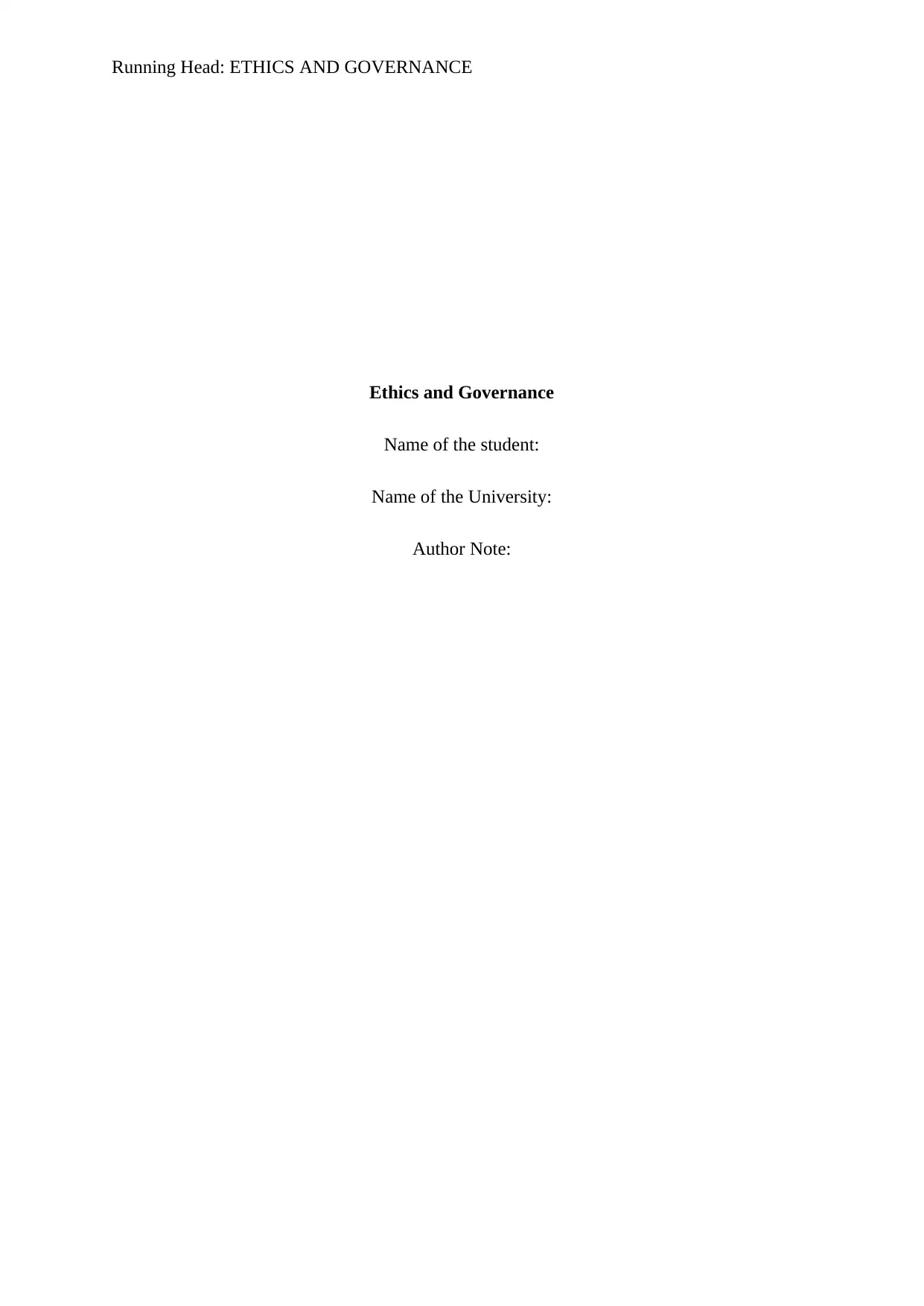
Running Head: ETHICS AND GOVERNANCE
Ethics and Governance
Name of the student:
Name of the University:
Author Note:
Ethics and Governance
Name of the student:
Name of the University:
Author Note:
Secure Best Marks with AI Grader
Need help grading? Try our AI Grader for instant feedback on your assignments.
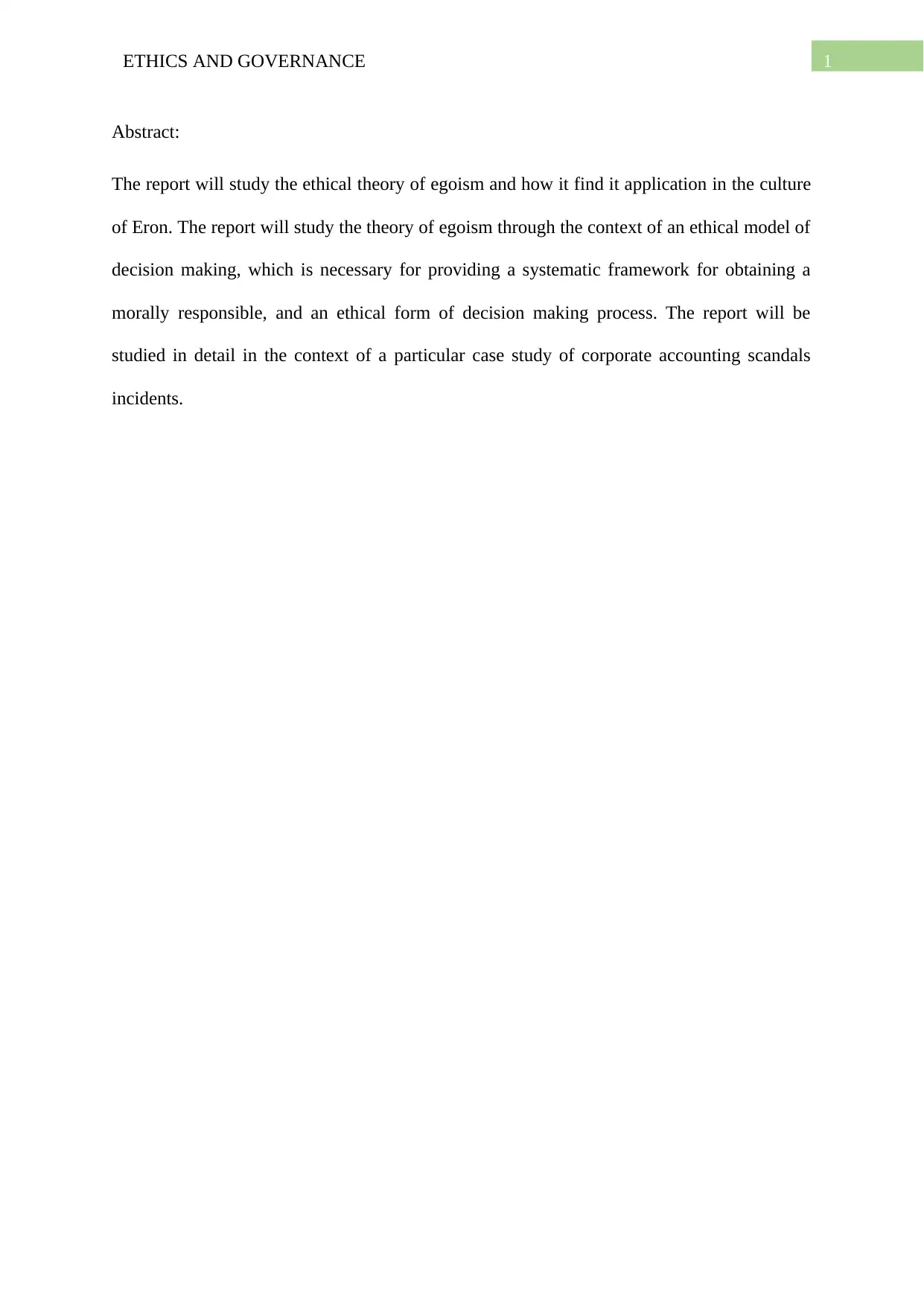
1ETHICS AND GOVERNANCE
Abstract:
The report will study the ethical theory of egoism and how it find it application in the culture
of Eron. The report will study the theory of egoism through the context of an ethical model of
decision making, which is necessary for providing a systematic framework for obtaining a
morally responsible, and an ethical form of decision making process. The report will be
studied in detail in the context of a particular case study of corporate accounting scandals
incidents.
Abstract:
The report will study the ethical theory of egoism and how it find it application in the culture
of Eron. The report will study the theory of egoism through the context of an ethical model of
decision making, which is necessary for providing a systematic framework for obtaining a
morally responsible, and an ethical form of decision making process. The report will be
studied in detail in the context of a particular case study of corporate accounting scandals
incidents.
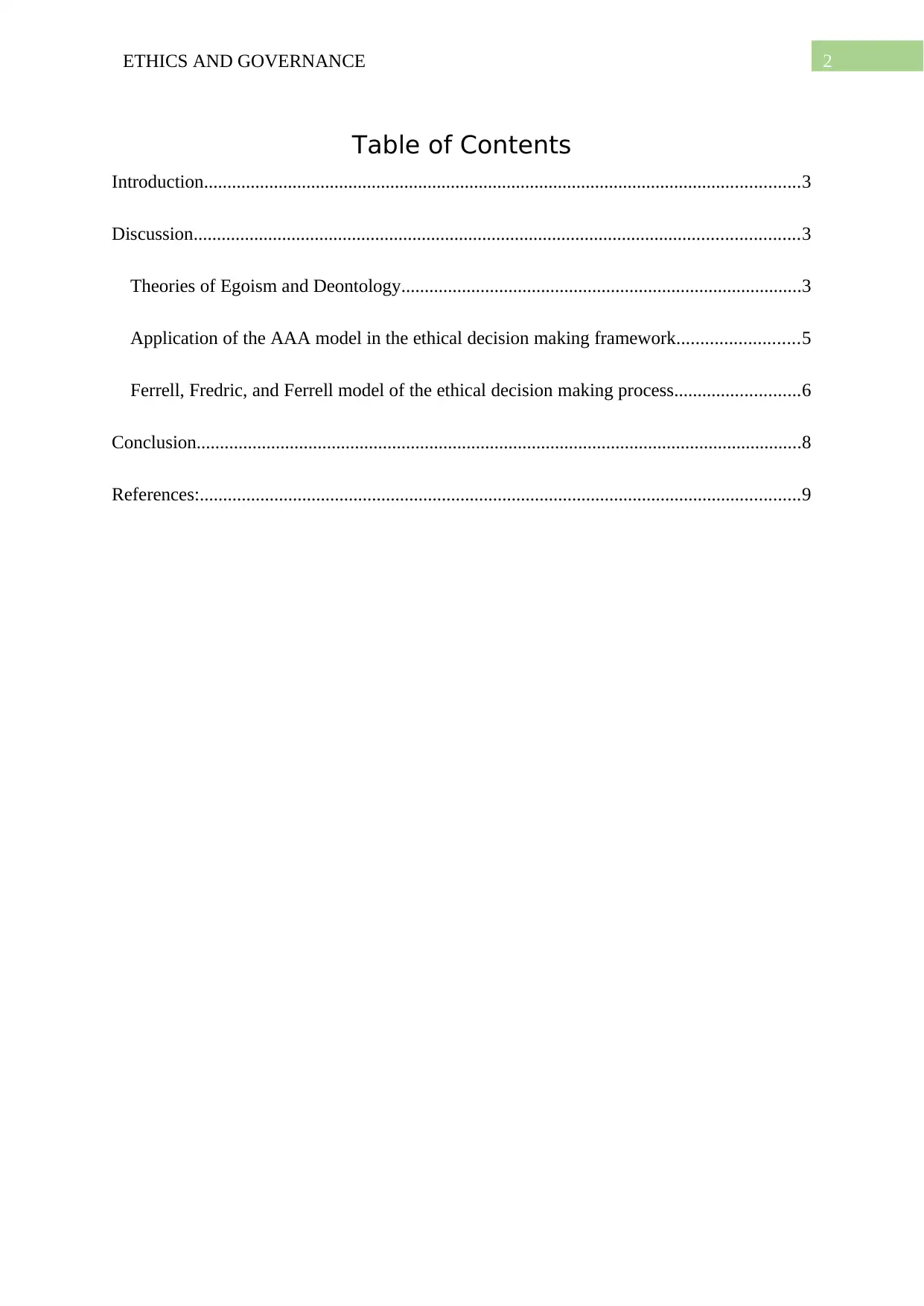
2ETHICS AND GOVERNANCE
Table of Contents
Introduction................................................................................................................................3
Discussion..................................................................................................................................3
Theories of Egoism and Deontology......................................................................................3
Application of the AAA model in the ethical decision making framework..........................5
Ferrell, Fredric, and Ferrell model of the ethical decision making process...........................6
Conclusion..................................................................................................................................8
References:.................................................................................................................................9
Table of Contents
Introduction................................................................................................................................3
Discussion..................................................................................................................................3
Theories of Egoism and Deontology......................................................................................3
Application of the AAA model in the ethical decision making framework..........................5
Ferrell, Fredric, and Ferrell model of the ethical decision making process...........................6
Conclusion..................................................................................................................................8
References:.................................................................................................................................9
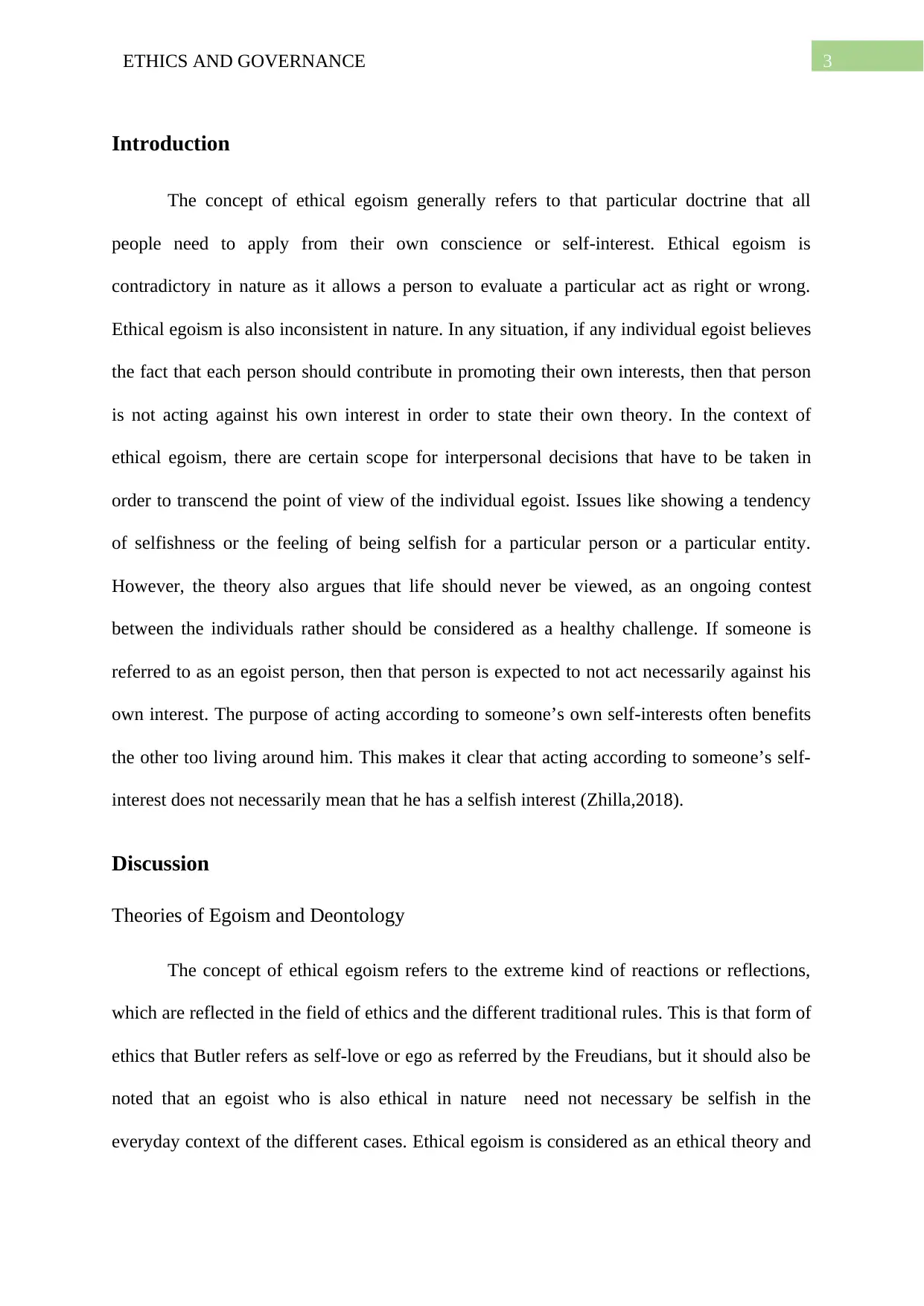
3ETHICS AND GOVERNANCE
Introduction
The concept of ethical egoism generally refers to that particular doctrine that all
people need to apply from their own conscience or self-interest. Ethical egoism is
contradictory in nature as it allows a person to evaluate a particular act as right or wrong.
Ethical egoism is also inconsistent in nature. In any situation, if any individual egoist believes
the fact that each person should contribute in promoting their own interests, then that person
is not acting against his own interest in order to state their own theory. In the context of
ethical egoism, there are certain scope for interpersonal decisions that have to be taken in
order to transcend the point of view of the individual egoist. Issues like showing a tendency
of selfishness or the feeling of being selfish for a particular person or a particular entity.
However, the theory also argues that life should never be viewed, as an ongoing contest
between the individuals rather should be considered as a healthy challenge. If someone is
referred to as an egoist person, then that person is expected to not act necessarily against his
own interest. The purpose of acting according to someone’s own self-interests often benefits
the other too living around him. This makes it clear that acting according to someone’s self-
interest does not necessarily mean that he has a selfish interest (Zhilla,2018).
Discussion
Theories of Egoism and Deontology
The concept of ethical egoism refers to the extreme kind of reactions or reflections,
which are reflected in the field of ethics and the different traditional rules. This is that form of
ethics that Butler refers as self-love or ego as referred by the Freudians, but it should also be
noted that an egoist who is also ethical in nature need not necessary be selfish in the
everyday context of the different cases. Ethical egoism is considered as an ethical theory and
Introduction
The concept of ethical egoism generally refers to that particular doctrine that all
people need to apply from their own conscience or self-interest. Ethical egoism is
contradictory in nature as it allows a person to evaluate a particular act as right or wrong.
Ethical egoism is also inconsistent in nature. In any situation, if any individual egoist believes
the fact that each person should contribute in promoting their own interests, then that person
is not acting against his own interest in order to state their own theory. In the context of
ethical egoism, there are certain scope for interpersonal decisions that have to be taken in
order to transcend the point of view of the individual egoist. Issues like showing a tendency
of selfishness or the feeling of being selfish for a particular person or a particular entity.
However, the theory also argues that life should never be viewed, as an ongoing contest
between the individuals rather should be considered as a healthy challenge. If someone is
referred to as an egoist person, then that person is expected to not act necessarily against his
own interest. The purpose of acting according to someone’s own self-interests often benefits
the other too living around him. This makes it clear that acting according to someone’s self-
interest does not necessarily mean that he has a selfish interest (Zhilla,2018).
Discussion
Theories of Egoism and Deontology
The concept of ethical egoism refers to the extreme kind of reactions or reflections,
which are reflected in the field of ethics and the different traditional rules. This is that form of
ethics that Butler refers as self-love or ego as referred by the Freudians, but it should also be
noted that an egoist who is also ethical in nature need not necessary be selfish in the
everyday context of the different cases. Ethical egoism is considered as an ethical theory and
Secure Best Marks with AI Grader
Need help grading? Try our AI Grader for instant feedback on your assignments.
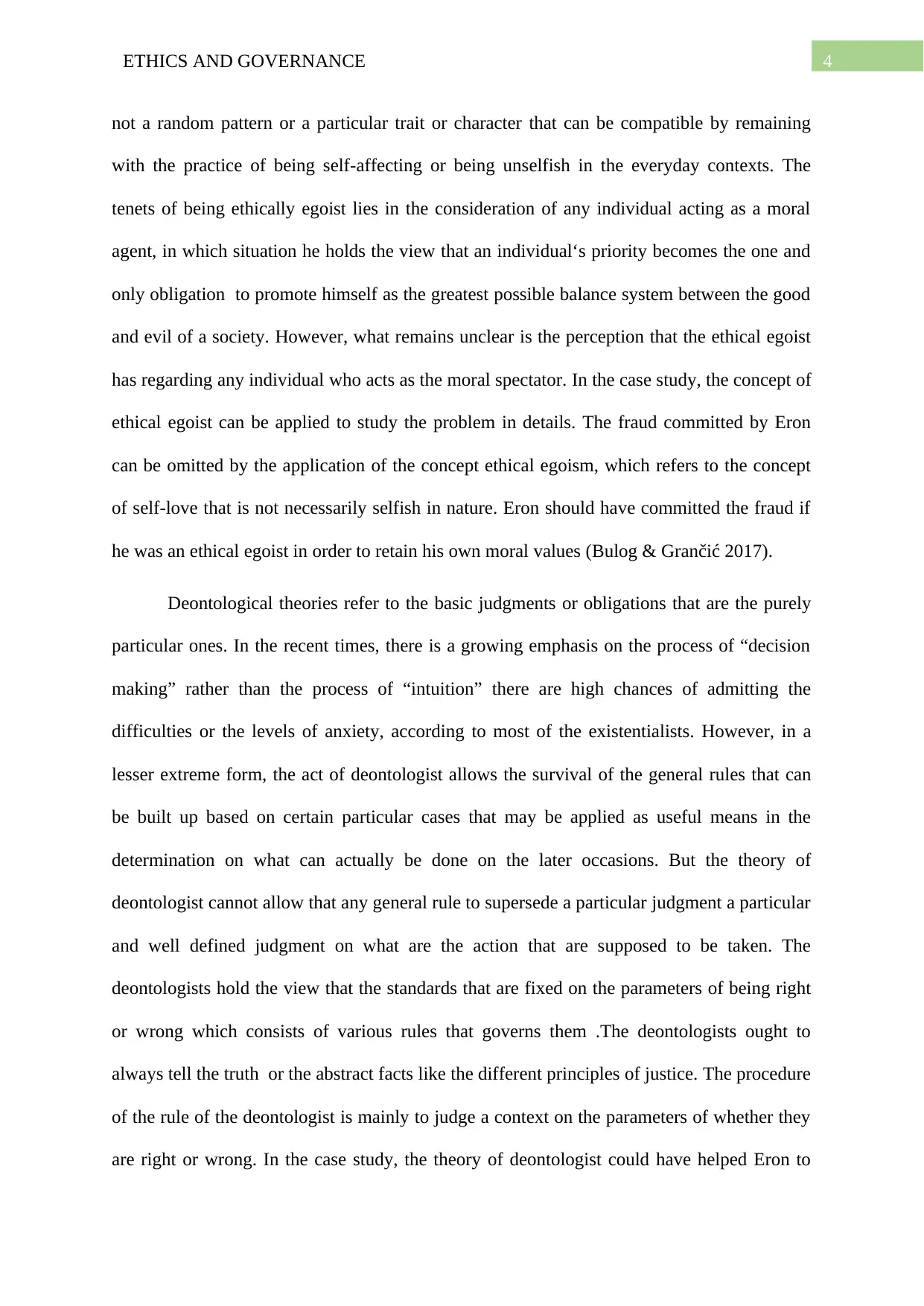
4ETHICS AND GOVERNANCE
not a random pattern or a particular trait or character that can be compatible by remaining
with the practice of being self-affecting or being unselfish in the everyday contexts. The
tenets of being ethically egoist lies in the consideration of any individual acting as a moral
agent, in which situation he holds the view that an individual‘s priority becomes the one and
only obligation to promote himself as the greatest possible balance system between the good
and evil of a society. However, what remains unclear is the perception that the ethical egoist
has regarding any individual who acts as the moral spectator. In the case study, the concept of
ethical egoist can be applied to study the problem in details. The fraud committed by Eron
can be omitted by the application of the concept ethical egoism, which refers to the concept
of self-love that is not necessarily selfish in nature. Eron should have committed the fraud if
he was an ethical egoist in order to retain his own moral values (Bulog & Grančić 2017).
Deontological theories refer to the basic judgments or obligations that are the purely
particular ones. In the recent times, there is a growing emphasis on the process of “decision
making” rather than the process of “intuition” there are high chances of admitting the
difficulties or the levels of anxiety, according to most of the existentialists. However, in a
lesser extreme form, the act of deontologist allows the survival of the general rules that can
be built up based on certain particular cases that may be applied as useful means in the
determination on what can actually be done on the later occasions. But the theory of
deontologist cannot allow that any general rule to supersede a particular judgment a particular
and well defined judgment on what are the action that are supposed to be taken. The
deontologists hold the view that the standards that are fixed on the parameters of being right
or wrong which consists of various rules that governs them .The deontologists ought to
always tell the truth or the abstract facts like the different principles of justice. The procedure
of the rule of the deontologist is mainly to judge a context on the parameters of whether they
are right or wrong. In the case study, the theory of deontologist could have helped Eron to
not a random pattern or a particular trait or character that can be compatible by remaining
with the practice of being self-affecting or being unselfish in the everyday contexts. The
tenets of being ethically egoist lies in the consideration of any individual acting as a moral
agent, in which situation he holds the view that an individual‘s priority becomes the one and
only obligation to promote himself as the greatest possible balance system between the good
and evil of a society. However, what remains unclear is the perception that the ethical egoist
has regarding any individual who acts as the moral spectator. In the case study, the concept of
ethical egoist can be applied to study the problem in details. The fraud committed by Eron
can be omitted by the application of the concept ethical egoism, which refers to the concept
of self-love that is not necessarily selfish in nature. Eron should have committed the fraud if
he was an ethical egoist in order to retain his own moral values (Bulog & Grančić 2017).
Deontological theories refer to the basic judgments or obligations that are the purely
particular ones. In the recent times, there is a growing emphasis on the process of “decision
making” rather than the process of “intuition” there are high chances of admitting the
difficulties or the levels of anxiety, according to most of the existentialists. However, in a
lesser extreme form, the act of deontologist allows the survival of the general rules that can
be built up based on certain particular cases that may be applied as useful means in the
determination on what can actually be done on the later occasions. But the theory of
deontologist cannot allow that any general rule to supersede a particular judgment a particular
and well defined judgment on what are the action that are supposed to be taken. The
deontologists hold the view that the standards that are fixed on the parameters of being right
or wrong which consists of various rules that governs them .The deontologists ought to
always tell the truth or the abstract facts like the different principles of justice. The procedure
of the rule of the deontologist is mainly to judge a context on the parameters of whether they
are right or wrong. In the case study, the theory of deontologist could have helped Eron to
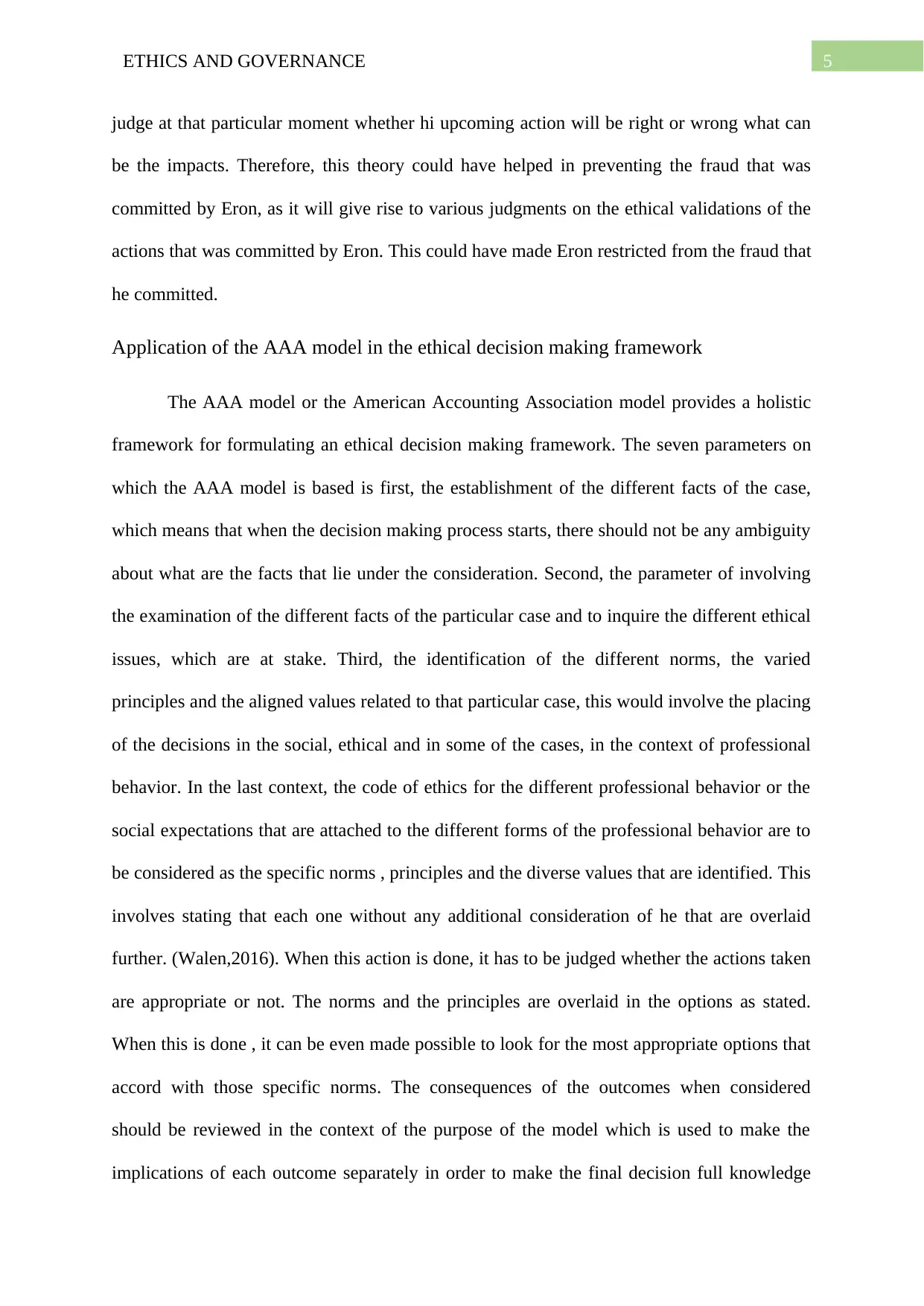
5ETHICS AND GOVERNANCE
judge at that particular moment whether hi upcoming action will be right or wrong what can
be the impacts. Therefore, this theory could have helped in preventing the fraud that was
committed by Eron, as it will give rise to various judgments on the ethical validations of the
actions that was committed by Eron. This could have made Eron restricted from the fraud that
he committed.
Application of the AAA model in the ethical decision making framework
The AAA model or the American Accounting Association model provides a holistic
framework for formulating an ethical decision making framework. The seven parameters on
which the AAA model is based is first, the establishment of the different facts of the case,
which means that when the decision making process starts, there should not be any ambiguity
about what are the facts that lie under the consideration. Second, the parameter of involving
the examination of the different facts of the particular case and to inquire the different ethical
issues, which are at stake. Third, the identification of the different norms, the varied
principles and the aligned values related to that particular case, this would involve the placing
of the decisions in the social, ethical and in some of the cases, in the context of professional
behavior. In the last context, the code of ethics for the different professional behavior or the
social expectations that are attached to the different forms of the professional behavior are to
be considered as the specific norms , principles and the diverse values that are identified. This
involves stating that each one without any additional consideration of he that are overlaid
further. (Walen,2016). When this action is done, it has to be judged whether the actions taken
are appropriate or not. The norms and the principles are overlaid in the options as stated.
When this is done , it can be even made possible to look for the most appropriate options that
accord with those specific norms. The consequences of the outcomes when considered
should be reviewed in the context of the purpose of the model which is used to make the
implications of each outcome separately in order to make the final decision full knowledge
judge at that particular moment whether hi upcoming action will be right or wrong what can
be the impacts. Therefore, this theory could have helped in preventing the fraud that was
committed by Eron, as it will give rise to various judgments on the ethical validations of the
actions that was committed by Eron. This could have made Eron restricted from the fraud that
he committed.
Application of the AAA model in the ethical decision making framework
The AAA model or the American Accounting Association model provides a holistic
framework for formulating an ethical decision making framework. The seven parameters on
which the AAA model is based is first, the establishment of the different facts of the case,
which means that when the decision making process starts, there should not be any ambiguity
about what are the facts that lie under the consideration. Second, the parameter of involving
the examination of the different facts of the particular case and to inquire the different ethical
issues, which are at stake. Third, the identification of the different norms, the varied
principles and the aligned values related to that particular case, this would involve the placing
of the decisions in the social, ethical and in some of the cases, in the context of professional
behavior. In the last context, the code of ethics for the different professional behavior or the
social expectations that are attached to the different forms of the professional behavior are to
be considered as the specific norms , principles and the diverse values that are identified. This
involves stating that each one without any additional consideration of he that are overlaid
further. (Walen,2016). When this action is done, it has to be judged whether the actions taken
are appropriate or not. The norms and the principles are overlaid in the options as stated.
When this is done , it can be even made possible to look for the most appropriate options that
accord with those specific norms. The consequences of the outcomes when considered
should be reviewed in the context of the purpose of the model which is used to make the
implications of each outcome separately in order to make the final decision full knowledge
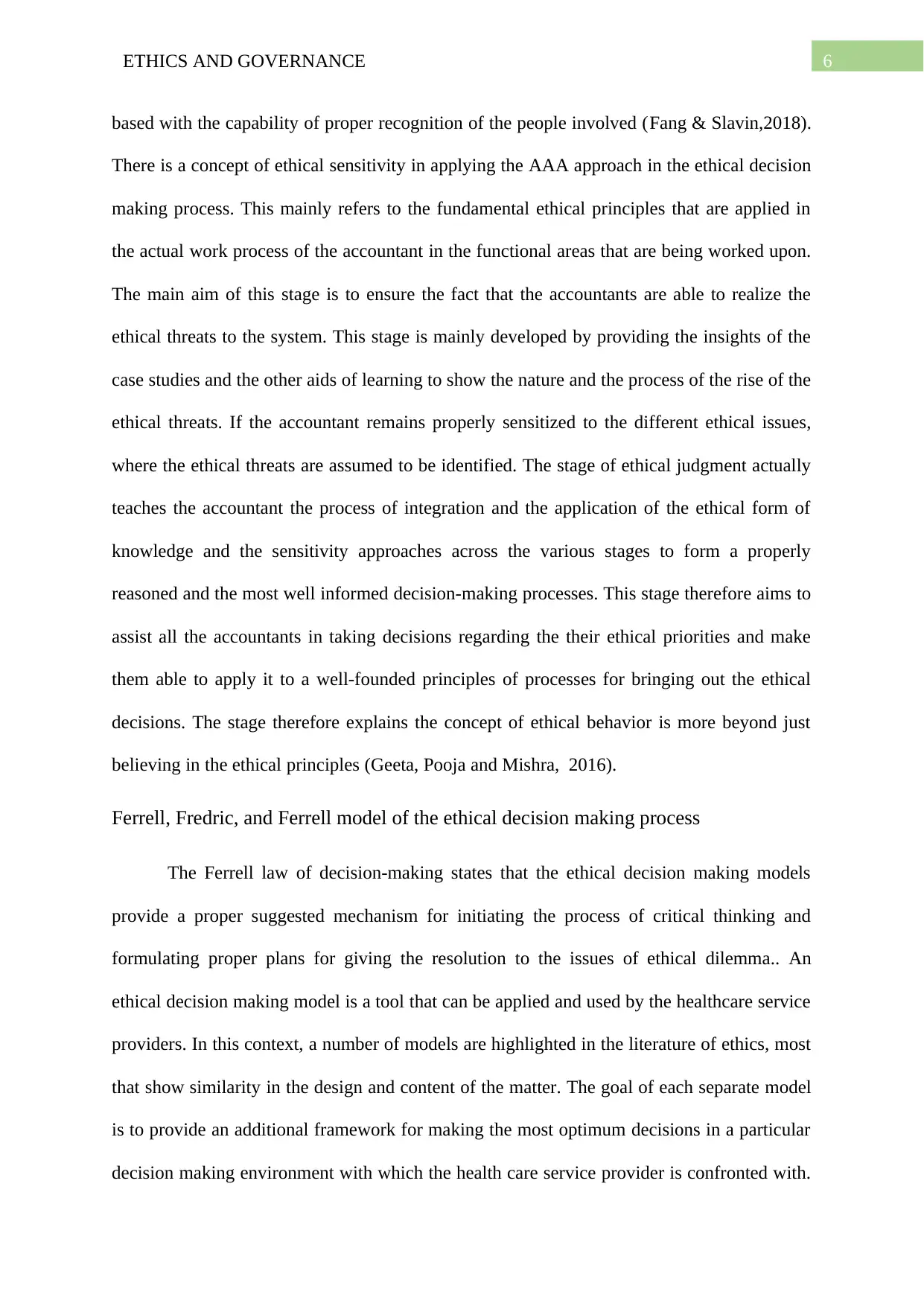
6ETHICS AND GOVERNANCE
based with the capability of proper recognition of the people involved (Fang & Slavin,2018).
There is a concept of ethical sensitivity in applying the AAA approach in the ethical decision
making process. This mainly refers to the fundamental ethical principles that are applied in
the actual work process of the accountant in the functional areas that are being worked upon.
The main aim of this stage is to ensure the fact that the accountants are able to realize the
ethical threats to the system. This stage is mainly developed by providing the insights of the
case studies and the other aids of learning to show the nature and the process of the rise of the
ethical threats. If the accountant remains properly sensitized to the different ethical issues,
where the ethical threats are assumed to be identified. The stage of ethical judgment actually
teaches the accountant the process of integration and the application of the ethical form of
knowledge and the sensitivity approaches across the various stages to form a properly
reasoned and the most well informed decision-making processes. This stage therefore aims to
assist all the accountants in taking decisions regarding the their ethical priorities and make
them able to apply it to a well-founded principles of processes for bringing out the ethical
decisions. The stage therefore explains the concept of ethical behavior is more beyond just
believing in the ethical principles (Geeta, Pooja and Mishra, 2016).
Ferrell, Fredric, and Ferrell model of the ethical decision making process
The Ferrell law of decision-making states that the ethical decision making models
provide a proper suggested mechanism for initiating the process of critical thinking and
formulating proper plans for giving the resolution to the issues of ethical dilemma.. An
ethical decision making model is a tool that can be applied and used by the healthcare service
providers. In this context, a number of models are highlighted in the literature of ethics, most
that show similarity in the design and content of the matter. The goal of each separate model
is to provide an additional framework for making the most optimum decisions in a particular
decision making environment with which the health care service provider is confronted with.
based with the capability of proper recognition of the people involved (Fang & Slavin,2018).
There is a concept of ethical sensitivity in applying the AAA approach in the ethical decision
making process. This mainly refers to the fundamental ethical principles that are applied in
the actual work process of the accountant in the functional areas that are being worked upon.
The main aim of this stage is to ensure the fact that the accountants are able to realize the
ethical threats to the system. This stage is mainly developed by providing the insights of the
case studies and the other aids of learning to show the nature and the process of the rise of the
ethical threats. If the accountant remains properly sensitized to the different ethical issues,
where the ethical threats are assumed to be identified. The stage of ethical judgment actually
teaches the accountant the process of integration and the application of the ethical form of
knowledge and the sensitivity approaches across the various stages to form a properly
reasoned and the most well informed decision-making processes. This stage therefore aims to
assist all the accountants in taking decisions regarding the their ethical priorities and make
them able to apply it to a well-founded principles of processes for bringing out the ethical
decisions. The stage therefore explains the concept of ethical behavior is more beyond just
believing in the ethical principles (Geeta, Pooja and Mishra, 2016).
Ferrell, Fredric, and Ferrell model of the ethical decision making process
The Ferrell law of decision-making states that the ethical decision making models
provide a proper suggested mechanism for initiating the process of critical thinking and
formulating proper plans for giving the resolution to the issues of ethical dilemma.. An
ethical decision making model is a tool that can be applied and used by the healthcare service
providers. In this context, a number of models are highlighted in the literature of ethics, most
that show similarity in the design and content of the matter. The goal of each separate model
is to provide an additional framework for making the most optimum decisions in a particular
decision making environment with which the health care service provider is confronted with.
Paraphrase This Document
Need a fresh take? Get an instant paraphrase of this document with our AI Paraphraser
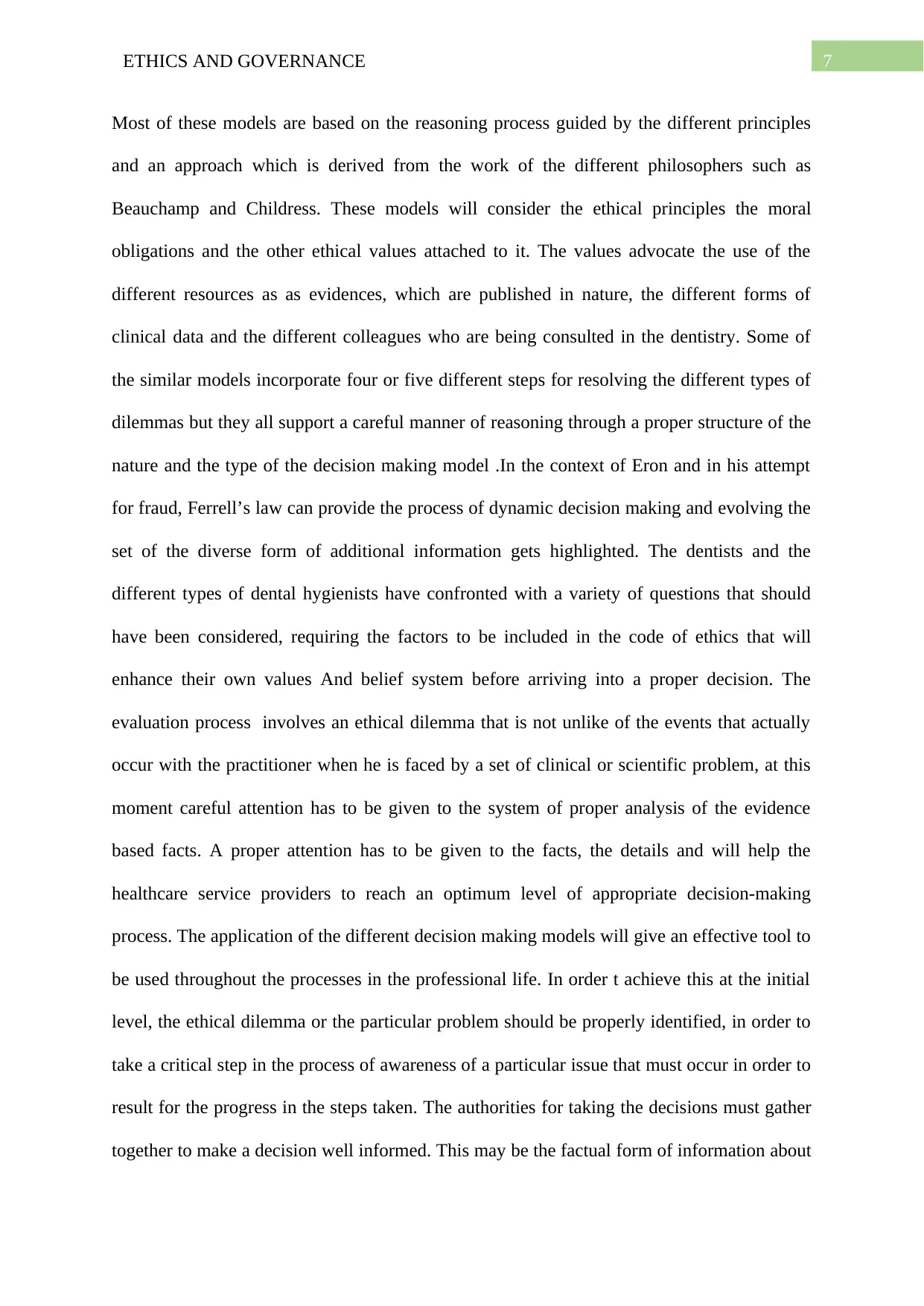
7ETHICS AND GOVERNANCE
Most of these models are based on the reasoning process guided by the different principles
and an approach which is derived from the work of the different philosophers such as
Beauchamp and Childress. These models will consider the ethical principles the moral
obligations and the other ethical values attached to it. The values advocate the use of the
different resources as as evidences, which are published in nature, the different forms of
clinical data and the different colleagues who are being consulted in the dentistry. Some of
the similar models incorporate four or five different steps for resolving the different types of
dilemmas but they all support a careful manner of reasoning through a proper structure of the
nature and the type of the decision making model .In the context of Eron and in his attempt
for fraud, Ferrell’s law can provide the process of dynamic decision making and evolving the
set of the diverse form of additional information gets highlighted. The dentists and the
different types of dental hygienists have confronted with a variety of questions that should
have been considered, requiring the factors to be included in the code of ethics that will
enhance their own values And belief system before arriving into a proper decision. The
evaluation process involves an ethical dilemma that is not unlike of the events that actually
occur with the practitioner when he is faced by a set of clinical or scientific problem, at this
moment careful attention has to be given to the system of proper analysis of the evidence
based facts. A proper attention has to be given to the facts, the details and will help the
healthcare service providers to reach an optimum level of appropriate decision-making
process. The application of the different decision making models will give an effective tool to
be used throughout the processes in the professional life. In order t achieve this at the initial
level, the ethical dilemma or the particular problem should be properly identified, in order to
take a critical step in the process of awareness of a particular issue that must occur in order to
result for the progress in the steps taken. The authorities for taking the decisions must gather
together to make a decision well informed. This may be the factual form of information about
Most of these models are based on the reasoning process guided by the different principles
and an approach which is derived from the work of the different philosophers such as
Beauchamp and Childress. These models will consider the ethical principles the moral
obligations and the other ethical values attached to it. The values advocate the use of the
different resources as as evidences, which are published in nature, the different forms of
clinical data and the different colleagues who are being consulted in the dentistry. Some of
the similar models incorporate four or five different steps for resolving the different types of
dilemmas but they all support a careful manner of reasoning through a proper structure of the
nature and the type of the decision making model .In the context of Eron and in his attempt
for fraud, Ferrell’s law can provide the process of dynamic decision making and evolving the
set of the diverse form of additional information gets highlighted. The dentists and the
different types of dental hygienists have confronted with a variety of questions that should
have been considered, requiring the factors to be included in the code of ethics that will
enhance their own values And belief system before arriving into a proper decision. The
evaluation process involves an ethical dilemma that is not unlike of the events that actually
occur with the practitioner when he is faced by a set of clinical or scientific problem, at this
moment careful attention has to be given to the system of proper analysis of the evidence
based facts. A proper attention has to be given to the facts, the details and will help the
healthcare service providers to reach an optimum level of appropriate decision-making
process. The application of the different decision making models will give an effective tool to
be used throughout the processes in the professional life. In order t achieve this at the initial
level, the ethical dilemma or the particular problem should be properly identified, in order to
take a critical step in the process of awareness of a particular issue that must occur in order to
result for the progress in the steps taken. The authorities for taking the decisions must gather
together to make a decision well informed. This may be the factual form of information about
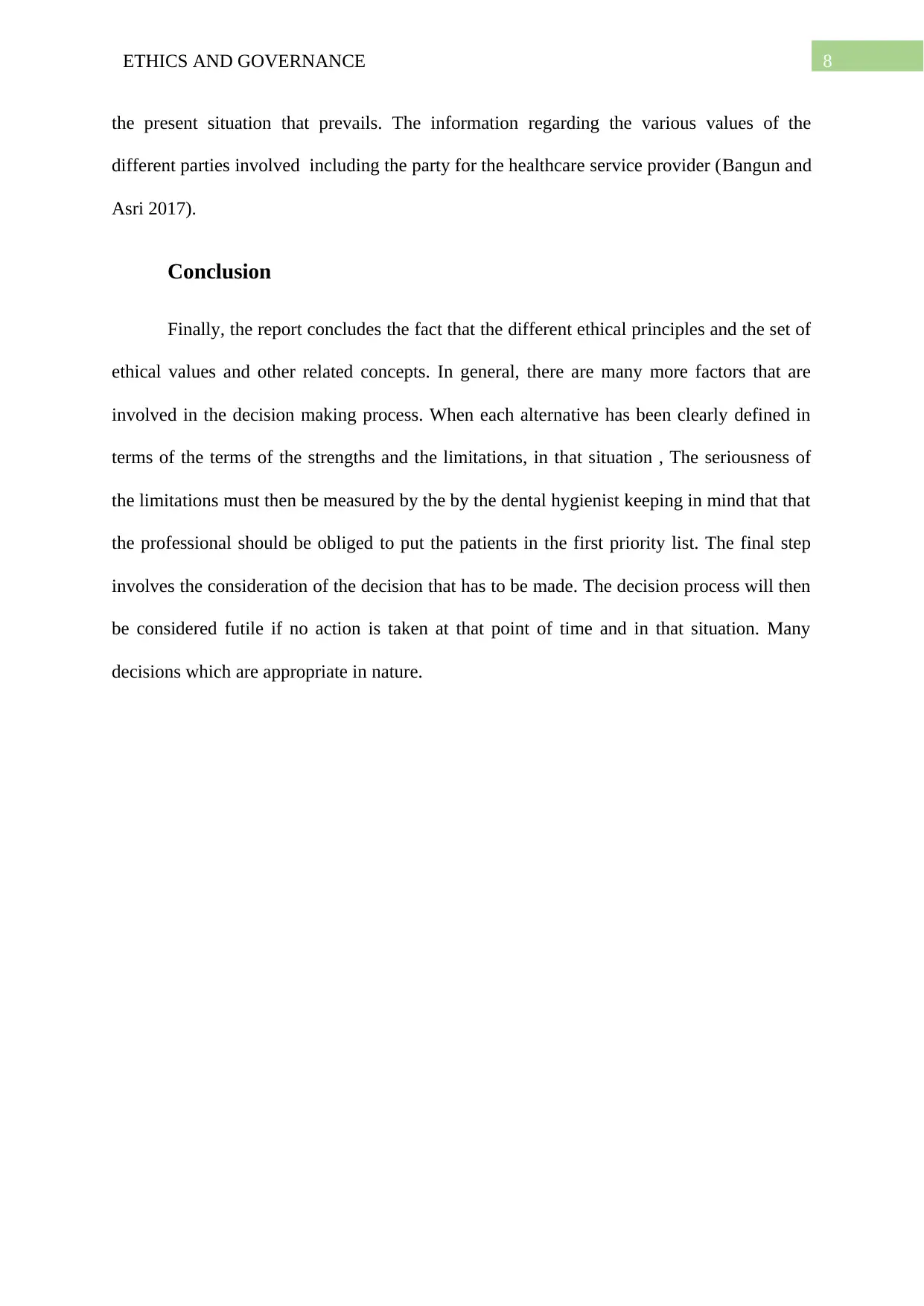
8ETHICS AND GOVERNANCE
the present situation that prevails. The information regarding the various values of the
different parties involved including the party for the healthcare service provider (Bangun and
Asri 2017).
Conclusion
Finally, the report concludes the fact that the different ethical principles and the set of
ethical values and other related concepts. In general, there are many more factors that are
involved in the decision making process. When each alternative has been clearly defined in
terms of the terms of the strengths and the limitations, in that situation , The seriousness of
the limitations must then be measured by the by the dental hygienist keeping in mind that that
the professional should be obliged to put the patients in the first priority list. The final step
involves the consideration of the decision that has to be made. The decision process will then
be considered futile if no action is taken at that point of time and in that situation. Many
decisions which are appropriate in nature.
the present situation that prevails. The information regarding the various values of the
different parties involved including the party for the healthcare service provider (Bangun and
Asri 2017).
Conclusion
Finally, the report concludes the fact that the different ethical principles and the set of
ethical values and other related concepts. In general, there are many more factors that are
involved in the decision making process. When each alternative has been clearly defined in
terms of the terms of the strengths and the limitations, in that situation , The seriousness of
the limitations must then be measured by the by the dental hygienist keeping in mind that that
the professional should be obliged to put the patients in the first priority list. The final step
involves the consideration of the decision that has to be made. The decision process will then
be considered futile if no action is taken at that point of time and in that situation. Many
decisions which are appropriate in nature.
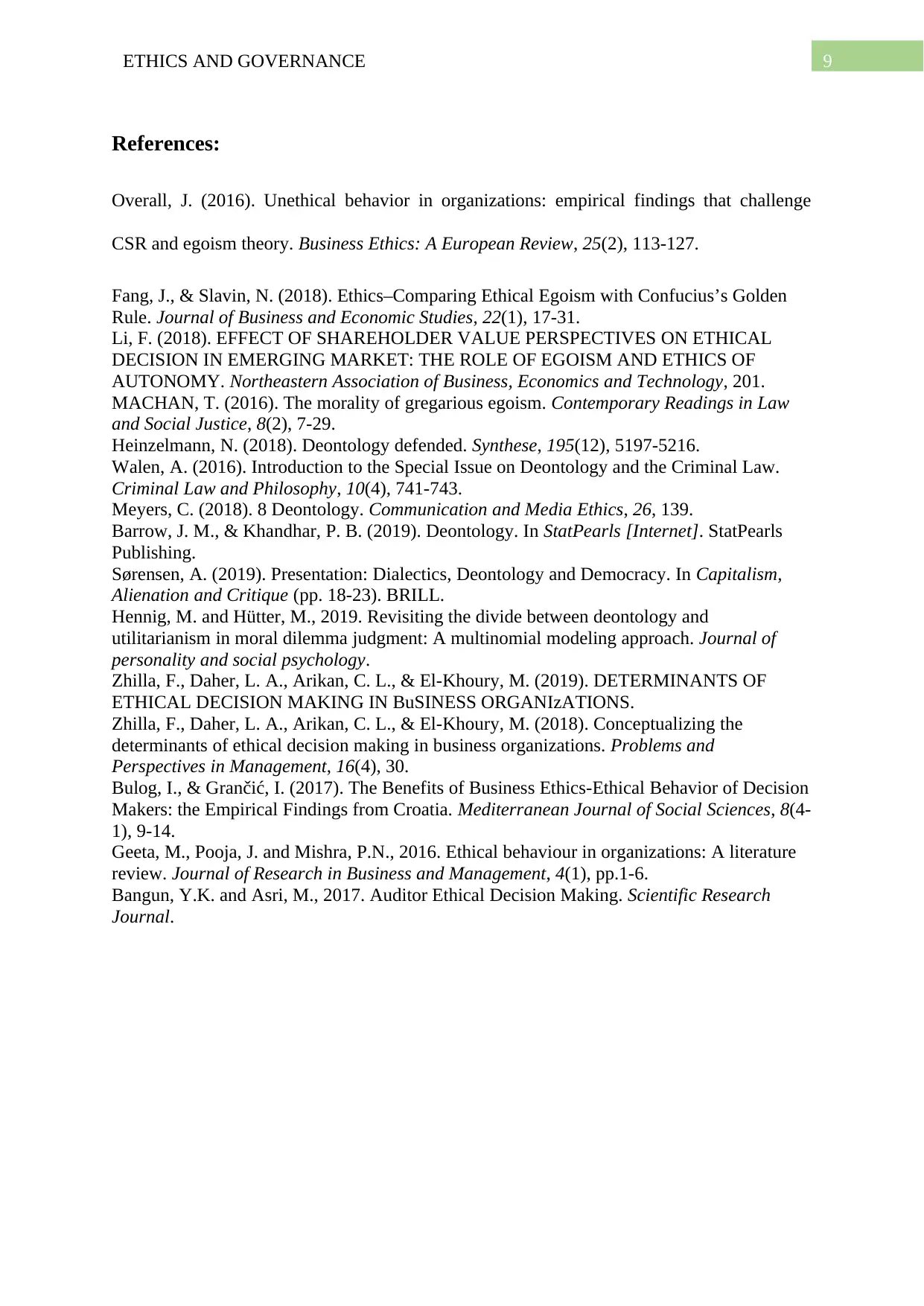
9ETHICS AND GOVERNANCE
References:
Overall, J. (2016). Unethical behavior in organizations: empirical findings that challenge
CSR and egoism theory. Business Ethics: A European Review, 25(2), 113-127.
Fang, J., & Slavin, N. (2018). Ethics–Comparing Ethical Egoism with Confucius’s Golden
Rule. Journal of Business and Economic Studies, 22(1), 17-31.
Li, F. (2018). EFFECT OF SHAREHOLDER VALUE PERSPECTIVES ON ETHICAL
DECISION IN EMERGING MARKET: THE ROLE OF EGOISM AND ETHICS OF
AUTONOMY. Northeastern Association of Business, Economics and Technology, 201.
MACHAN, T. (2016). The morality of gregarious egoism. Contemporary Readings in Law
and Social Justice, 8(2), 7-29.
Heinzelmann, N. (2018). Deontology defended. Synthese, 195(12), 5197-5216.
Walen, A. (2016). Introduction to the Special Issue on Deontology and the Criminal Law.
Criminal Law and Philosophy, 10(4), 741-743.
Meyers, C. (2018). 8 Deontology. Communication and Media Ethics, 26, 139.
Barrow, J. M., & Khandhar, P. B. (2019). Deontology. In StatPearls [Internet]. StatPearls
Publishing.
Sørensen, A. (2019). Presentation: Dialectics, Deontology and Democracy. In Capitalism,
Alienation and Critique (pp. 18-23). BRILL.
Hennig, M. and Hütter, M., 2019. Revisiting the divide between deontology and
utilitarianism in moral dilemma judgment: A multinomial modeling approach. Journal of
personality and social psychology.
Zhilla, F., Daher, L. A., Arikan, C. L., & El-Khoury, M. (2019). DETERMINANTS OF
ETHICAL DECISION MAKING IN BuSINESS ORGANIzATIONS.
Zhilla, F., Daher, L. A., Arikan, C. L., & El-Khoury, M. (2018). Conceptualizing the
determinants of ethical decision making in business organizations. Problems and
Perspectives in Management, 16(4), 30.
Bulog, I., & Grančić, I. (2017). The Benefits of Business Ethics-Ethical Behavior of Decision
Makers: the Empirical Findings from Croatia. Mediterranean Journal of Social Sciences, 8(4-
1), 9-14.
Geeta, M., Pooja, J. and Mishra, P.N., 2016. Ethical behaviour in organizations: A literature
review. Journal of Research in Business and Management, 4(1), pp.1-6.
Bangun, Y.K. and Asri, M., 2017. Auditor Ethical Decision Making. Scientific Research
Journal.
References:
Overall, J. (2016). Unethical behavior in organizations: empirical findings that challenge
CSR and egoism theory. Business Ethics: A European Review, 25(2), 113-127.
Fang, J., & Slavin, N. (2018). Ethics–Comparing Ethical Egoism with Confucius’s Golden
Rule. Journal of Business and Economic Studies, 22(1), 17-31.
Li, F. (2018). EFFECT OF SHAREHOLDER VALUE PERSPECTIVES ON ETHICAL
DECISION IN EMERGING MARKET: THE ROLE OF EGOISM AND ETHICS OF
AUTONOMY. Northeastern Association of Business, Economics and Technology, 201.
MACHAN, T. (2016). The morality of gregarious egoism. Contemporary Readings in Law
and Social Justice, 8(2), 7-29.
Heinzelmann, N. (2018). Deontology defended. Synthese, 195(12), 5197-5216.
Walen, A. (2016). Introduction to the Special Issue on Deontology and the Criminal Law.
Criminal Law and Philosophy, 10(4), 741-743.
Meyers, C. (2018). 8 Deontology. Communication and Media Ethics, 26, 139.
Barrow, J. M., & Khandhar, P. B. (2019). Deontology. In StatPearls [Internet]. StatPearls
Publishing.
Sørensen, A. (2019). Presentation: Dialectics, Deontology and Democracy. In Capitalism,
Alienation and Critique (pp. 18-23). BRILL.
Hennig, M. and Hütter, M., 2019. Revisiting the divide between deontology and
utilitarianism in moral dilemma judgment: A multinomial modeling approach. Journal of
personality and social psychology.
Zhilla, F., Daher, L. A., Arikan, C. L., & El-Khoury, M. (2019). DETERMINANTS OF
ETHICAL DECISION MAKING IN BuSINESS ORGANIzATIONS.
Zhilla, F., Daher, L. A., Arikan, C. L., & El-Khoury, M. (2018). Conceptualizing the
determinants of ethical decision making in business organizations. Problems and
Perspectives in Management, 16(4), 30.
Bulog, I., & Grančić, I. (2017). The Benefits of Business Ethics-Ethical Behavior of Decision
Makers: the Empirical Findings from Croatia. Mediterranean Journal of Social Sciences, 8(4-
1), 9-14.
Geeta, M., Pooja, J. and Mishra, P.N., 2016. Ethical behaviour in organizations: A literature
review. Journal of Research in Business and Management, 4(1), pp.1-6.
Bangun, Y.K. and Asri, M., 2017. Auditor Ethical Decision Making. Scientific Research
Journal.
1 out of 10
Related Documents
Your All-in-One AI-Powered Toolkit for Academic Success.
+13062052269
info@desklib.com
Available 24*7 on WhatsApp / Email
![[object Object]](/_next/static/media/star-bottom.7253800d.svg)
Unlock your academic potential
© 2024 | Zucol Services PVT LTD | All rights reserved.





